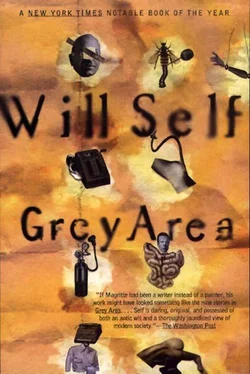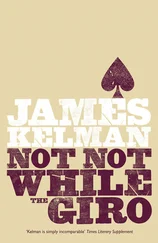Out in the street the sky was spitting at the pavement. There was no wind to speak of, but despite that each gob seemed to have an added impetus. With every corner that I rounded on my way to King’s Cross I encountered another little cyclone of rain and grit. I walked past shops full of mouldering stock that were boarded up, and empty, derelict ones that were still open.
On the corner of the Caledonian Road I almost collided with a dosser wearing a long, dirty overcoat. He was clutching a bottle of VP in a hand that was blue with impacted filth, filth that seemed to have been worked deliberately into the open sores on his knuckles. He turned his face to me and I recoiled instinctively. It was the face of a myxomatosic rabbit (‘You’re like a little animal in there. A little rabbit, snuggled down in its burrow’), the eyes swollen up and exploding in a series of burst ramparts and lesions of diseased flesh. His nose was no longer nose-shaped.
But on the tube the people were comforting and workaday enough. I paid at the barrier when I reached Camden Town and walked off quickly down the High Street. Perhaps it was the encounter with the dying drunk that had cleansed me, jerked me out of my self-pity, because for a short while I felt more lucid, better able to look honestly at my relationship. While it was true that he did have problems, emotional problems, and was prepared to admit to them, it was still the case that nothing could forgive his conduct while I was away visiting my parents.
I knew that the woman he had slept with lived here in Camden Town. As I walked down the High Street I began — at first almost unconsciously, then with growing intensity — to examine the faces of any youngish women that passed me. They came in all shapes and sizes, these suspect lovers. There were tall women in floor, length linen coats; plump women in stretchy slacks; petite women in neat, two-piece suits; raddled women in unravelling pullovers; and painfully smart women, Sindy dolls: press a pleasure-button in the small of their backs and their hair would grow.
The trouble was that they all looked perfectly plausible candidates for the job as the metal worker’s anvil. Outside Woolworth’s I was gripped by a sharp attack of nausea. An old swallow of milky coffee reentered my mouth as I thought of him, on top of this woman, on top of that woman, hammering himself into them, bash after bash after bash, flattening their bodies, making them ductile with pleasure.
I went into Marks & Sparks to buy some clean underwear and paused to look at myself in a full-length mirror. My skirt was bunched up around my hips, my hair was lank and flecked with dandruff, my tights bagged at the knees, my sleeve-ends bulged with snot-clogged Kleenex. I looked like shit. It was no wonder that he didn’t fancy me any more, that he’d gone looking for some retouched vision.
‘Come on,’ said Grace, ‘let’s go. The longer we stay here, the more weight we put on.’ On our way out of the café I took a mint from the cut-glass bowl by the cash register and recklessly crunched it between my molars. The sweet pain of sugar-in-cavity spread through my mouth as I fumbled in my bag for my purse. ‘Well, what are you going to do now?’ It was only three-thirty in the afternoon but already the sky over London was turning the shocking bilious colour it only ever aspires to when winter is fast encroaching.
‘Can I come back with you, Grace?’
‘Of course you can, silly, why do you think I asked the question?’ She put her arm about my shoulder and twirled me round until we were facing in the direction of the tube. Then she marched me off, like the young emotional offender that I was. Feeling her warm body against mine I almost choked, about to cry again at this display of caring from Grace. But I needed her too much, so I restrained myself.
‘You come back with me, love,’ she clucked. ‘We can watch telly, or eat, or you can do some work. I’ve got some pattern cutting I’ve got to finish by tomorrow. John won’t be back for ages yet. . or I tell you what, if you like we can go and meet him in Soho after he’s finished work and have something to eat there — would you like that?’ She turned to me, flicking back the ledge of her thick blonde fringe with her index finger — a characteristic gesture.
‘Well, yes,’ I murmured, ‘whatever.’
‘OK.’ Her eyes, turned towards mine, were blue, frank. ‘I can see you want to take it easy.’
When we left the tube at Chalk Farm and started up the hill towards where Grace lived, she started up again, wittering on about her and John and me; about what we might do and what fun it would be to have me stay for a couple of nights; and about what a pity it was that I couldn’t live with them for a while, because what I really needed was a good sense of security. There was something edgy and brittle about her enthusiasm. I began to feel that she was overstating her case.
I stopped listening to the words she was saying and began to hear them merely as sounds, as some ambient tape of reassurance. Her arm was linked in mine, but from this slight contact I could gain a whole sense of her small body. The precise slope and jut of her full breasts, the soft brush of her round stomach against the drape of her dress, the infinitesimal gratings of knee against nylon, against nylon against knee.
And as I built up this sense of Grace-as-body, I began also to consider how her bush would look as you went down on her. Would the lips gape wetly, or would they tidily recede? Would the cellulite on her hips crinkle as she parted her legs? How would she smell to you, of sex or cinnamon? But, of course, it wasn’t any impersonal ‘you’ I was thinking of — it was a highly personal him. I joined their bodies together in my mind and tormented myself with the hideous tableau of betrayal. After all, if he was prepared to screw some nameless bitch, what would have prevented him from shirting where I ate? I shuddered. Grace sensed this, and disengaging her arm from mine returned it to my shoulders, which she gave a squeeze.
John and Grace lived in a thirties council block halfway up Haverstock Hill. Their flat was just like all the others. You stepped through the front door and directly into a long corridor, off which were a number of small rooms. They may have been small, but Grace had done everything possible to make them seem spacious. Furniture and pictures were kept to an artful minimum, and the wooden blocks on the floor had been sanded and polished until they shone.
Grace snapped on floor lamps and put a Mozart concerto on the CD. I tried to write my neglected journal, timing my flourishes of supposed insight to the ascending and descending scales. Grace set up the ironing board and began to do something complicated, involving sheets of paper, pins, and round, worn fragments of chalk.
When the music finished, neither of us made any move to put something else on, or to draw the curtains. Instead we sat in the off-white noise of the speakers, under the opaque stare of the dark windows. To me there was something intensely evocative about the scene: two young women sitting in a pool of yellow light on a winter’s afternoon. Images of my childhood came to me; for the first time in days I felt secure.
When John got back from work, Grace put food-in-a-foil-tray in the oven, and tossed some varieties of leaves. John plonked himself down on one of the low chairs in the sitting room and propped the Standard on his knees. Occasionally he would give a snide laugh and read out an item, his intent being always to emphasise the utter consistency of its editorial stupidity.
We ate with our plates balanced on our knees, and when we had finished, turned on the television to watch a play. I noticed that John didn’t move over to the sofa to sit with Grace. Instead, he remained slumped in his chair. As the drama unfolded I began to find these seating positions quite wrong and disquieting. John really should have sat with Grace.
Читать дальше












